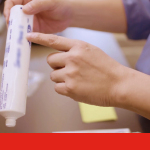Breakthrough New Design Gives Reason to Smile
NEW YORK–(BUSINESS WIRE)–#Colgate–Colgate has found a way to make the toothpaste you rely on for a
healthier smile a part of the solution for a healthier planet.
Colgate has finalized the design of a first-of-its kind recyclable
toothpaste tube that sets a new standard in the industry. The
Association of Plastic Recyclers (APR) last week announced its
recognition of the new tube – an essential step in bringing it to the
public. The Colgate design is the first oral care or personal care tube
to earn APR recognition for recyclability.
Under development for more than five years, the tube will debut under
the Company’s Tom’s of Maine brand in the U.S. in 2020. Roll out to
select global markets under the Colgate brand will follow. The Company
plans to fully convert to recyclable tubes by 2025, when all of its
products will be in 100% recyclable packaging.
“Building a future to smile about means finding new packaging solutions
that are better for the planet, but until now there hasn’t been a way to
make toothpaste tubes part of the recycling stream,” said Justin Skala,
Executive Vice President, Chief Growth & Strategy Officer for
Colgate-Palmolive. “Once we’ve proven the new tube with consumers, we
intend to offer the technology to the makers of plastic tubes for all
kinds of products. By encouraging others to use this technology, we can
have an even bigger impact and increase the long-term market viability
of this solution.”
Plastic tubes are a popular choice in a varied range of product
categories – from cosmetics and personal care products to
pharmaceuticals and food. Toothpaste alone accounts for an estimated 20
billion tubes annually around the world. Said APR President Steve
Alexander, “The Association of Plastic Recyclers appreciated the
opportunity to partner with Colgate on this important project. Tubes are
one of the most widely used forms of plastic packaging that still cannot
be recycled. There is a lot of work ahead, but we believe Colgate is off
to a great start.”
Development of the Recyclable Tube
Most toothpaste tubes are made from sheets of plastic laminate – usually
a combination of different plastics – often sandwiched around a thin
layer of aluminum that protects the toothpaste’s flavor and fluoride.
The mix of materials is pressed together into a single film, making it
impossible to recycle through conventional methods.
To make a recyclable tube, Colgate chose high-density polyethylene
(HDPE), the widely recycled “No. 2” plastic popular for bottle making.
But because HDPE is rigid, it isn’t well suited for ultra-thin laminate
sheets and soft, squeezable tubes.
Colgate’s “eureka moment” came when Company packaging engineers working
at its Piscataway, NJ, technology campus recognized that they could use
more than one grade of HDPE in their designs. The team then tested a
dozen different combinations – using from six to 20 layers – to find the
recipe that allows people to comfortably squeeze out all the toothpaste,
protects the integrity of the product, and meets the demands of
high-speed production.
To achieve APR recognition, Colgate also conducted tests to show that
its toothpaste tube could navigate the screens and conveyor belts at the
critically important Materials Recovery Facilities that sort
recyclables. Colgate used Radio Frequency Identification tags to track
the tubes and prove they would be properly sorted with plastic bottles.
And to demonstrate that the recyclable tube material could be repurposed
after recycling – another critical part of gaining APR recognition – the
Company ground up the tubes to successfully make new plastic bottles.
Building Support for Recycling the Tube
Making a recyclable tube is only part of the challenge. While APR
provides guidelines for recyclability in North America, Colgate will
need to engage similar organizations in other parts of the world as it
expands use of its new tube. It must also build awareness and support
among other recycling stakeholders: the Materials Recovery Facilities
that sort recyclables, the Reclaimers that produce resin from recycled
plastic, the municipalities that operate recycling programs, and others.
The Company has help. It is already partnering with several groups,
including More Recycling, a data and technology firm that works with
companies and others to navigate the recycling infrastructure and
support sustainable choices; and The Recycling Partnership, which
provides grants, technical assistance and communication support to
states, cities and communities to help residents recycle more and
recycle better.
“Colgate people are excited about this challenge and meeting our goal of
100% recyclable packaging,” said Ann Tracy, Vice President Global
Sustainability, EOHS and Supply Chain Strategy. “We’re committed to
using less plastic – and more recycled material – in our packaging.
We’re helping to strengthen recycling by supporting the Closed Loop Fund
and other efforts. And we’re exploring new ingredients and models,
including TerraCycle’s Loop™ initiative for reusable, refillable
packaging.”
About Colgate-Palmolive
Colgate-Palmolive is a leading global consumer products company, tightly
focused on Oral Care, Personal Care, Home Care and Pet Nutrition.
Colgate sells its products in over 200 countries and territories around
the world under such internationally recognized brand names as Colgate,
Palmolive, elmex, Tom’s of Maine, Sorriso, Speed Stick, Lady Speed
Stick, Softsoap, Irish Spring, Protex, Sanex, Elta MD, PCA Skin, Ajax,
Axion, Fabuloso, Soupline and Suavitel, as well as Hill’s Science Diet
and Hill’s Prescription Diet. For more information about Colgate’s
global business, visit the Company’s website at http://www.colgatepalmolive.com.
To learn more about Colgate Bright Smiles, Bright Futures oral health
education program, please visit http://www.colgatebsbf.com.
CL-C
Contacts
Thomas DiPiazza, 212-310-2670
colgate_palmolive_media_inquiry@colpal.com

